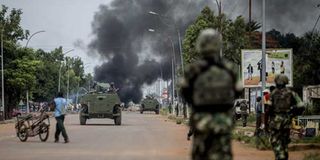The protest politics practised for 24 years has lost its appeal to Kenyans

Burundian peacekeepers of the African-led International Support Mission to the Central African Republic (MISCA) patrol near a barricade of burning tyres in the Bea-Rex district of Bangui on May 29, 2014. At least 15 people, including a priest, were killed and several others wounded in clashes on May 28 in the capital of the strife-torn Central African Republic, a military source said. Deeply impoverished Central Africa has been in crisis since the Seleka alliance seized power in a March 2013 coup led by Michael Djotodia. AFP PHOTO / MARCO LONGARI
What you need to know:
- The only places in Africa where there was death and chaos were Congo and Somalia. We were talking about the African Renaissance, would you believe?
- Bentiu, when the story is finally told, will rank as a shameful and infamous testament to the inhuman and brutish blood lust of the African.
- Libya is so insecure that some Al-Qaeda types took time off from rampaging for democracy and freedom to slaughter the US ambassador in Benghazi.
The air is thick with excitement. Vehicles have been lined up to start bussing the opposition faithful from the counties to Nairobi for the Uhuru Park rally tomorrow to welcome home Cord leader Raila Odinga.
I think the meeting is going to be lots of fun; there will definitely be music. There will be singing and dancing and there is going to be lots of fiery speeches.
Perhaps, the meeting will also serve as the launching pad for a series of protests to remove President Kenyatta and his Jubilee government. I don’t know.
However, I’m increasingly wary and tired of protest politics. A couple of years ago, I went to Kiev, the capital of Ukraine. It is an old, beautiful, if Soviet, city.
To the African eye, Ukraine looked like a developed country. It did not have the filthy, overcrowded feel of developing countries, even though some of the infrastructure was old, strange and crumbling.
Then neo-Nazis and other thugs joined up with politicians to launch a “freedom movement”, which sought to remove the democratically elected pro-Russian President, Russia annexed Crimea in a sham referendum, and the country all but broke into pieces.
I wonder what happened to the Congolese shoe shine guy I met in central Kiev.
AFRICAN RENAISSANCE
Five years ago, we were celebrating the outbreak of peace and democracy in Africa. South Africa was free; so was Namibia. The war in Angola was over and Jonas Savimbi was dead. Beautiful Mozambique was at peace.
The South Sudanese seceded and successfully had an election won by the Sudan People’s Liberation Movement. Tigray and Eritrea had won the war in Ethiopia.
Eritrea had seceded, fought a war with Ethiopia and settled into an uneasy peace.
The only places in Africa where there was death and chaos were Congo and Somalia. We were talking about the African Renaissance, would you believe?
Today, Africa is a very different place. North Africa is drenched in blood. Libya has Africa’s biggest proven reserves of oil, some 46.5 billion barrels. Today, more than 30,000 Libyans are dead and their economy has contracted by some truly staggering 62 per cent (Libya has an oil economy, so when no oil flows, the economy dries up. The UN had also imposed sanctions).
Libya is so insecure that some Al-Qaeda types took time off from rampaging for democracy and freedom to slaughter the US ambassador in Benghazi.
It was previously one of the most secure countries on the continent.
Africa is on fire. Mali has no government worth speaking of. The French have had to send troops in strength to keep rebels from taking it.
Nigeria is increasingly looking like a basket-case. Boko Haram kills Nigerians almost daily and takes schoolgirls hostage with impunity.
SHAMEFUL AND INFAMOUS TESTAMENT
In the Central African Republic, they have had a streak of massacres, a veritable orgy of blood and chaos. South Sudan, Africa’s newest beacon of hope has imploded in attempted coups and some of the worst slaughter seen in Africa in years.
Bentiu, when the story is finally told, will rank as a shameful and infamous testament to the inhuman and brutish blood lust of the African.
It is also in South Sudan that the strangest things have happened, ranging from the president confessing to have been coerced to sign a peace agreement on the pain of arrest, and reports of guns being found in United Nations containers.
When I look at all this chaos and bloodletting, all of it in the name of democracy, I begin to wonder if democracy has also started demanding bloody sacrifice, a goddess to whom African corpses must be offered.
So as ODM enjoys its rally and probably rolls out its mass action plan, I find that I have substantially lost my appetite for protest politics, the kind that the Kenyan opposition has practised for 24 years this July.
I don’t know whether it was from Dr Mukhisa Kituyi that I first heard the concept of negotiated democracy. I think it is something we might explore as an alternative to confrontation.
I think I have overdosed on all these lectures about freedom and democracy and failing governments and how, to quote Mr Muthama, “the country is no longer bigger than us, we are bigger than the country”.
At a time of great danger not just in Kenya but the whole continent, we need to find a formula for fighting for power in a safer manner.
Remember: “A great civilisation is not conquered from without until it has destroyed itself within.”





